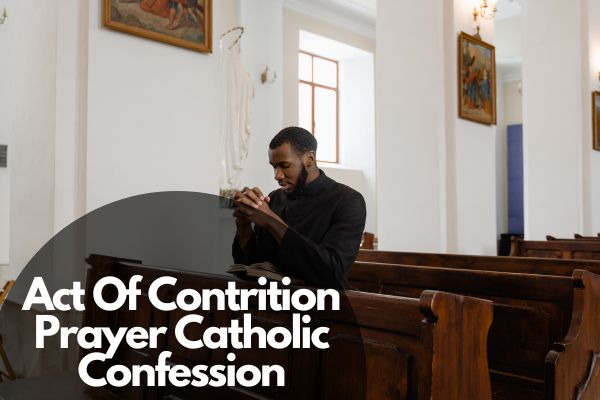In the sacrament of Confession, also known as Reconciliation, Catholics seek forgiveness for their sins through penance and reconciliation with God and the Church. Central to this sacrament is the Act of Contrition prayer, a heartfelt expression of sorrow and repentance. This article delves into the significance of the Act of Contrition prayer in Catholic Confession, exploring its origins, biblical foundations, and spiritual significance.
Act Of Contrition Prayer Catholic Confession
Here is the Act of Contrition prayer commonly used in Catholic Confession:
“Oh my God, I am heartily sorry for having offended Thee,
and I detest all my sins, because I dread the loss of heaven,
and the pains of hell;
But most of all because I love Thee, my God,
Who art all good and deserving of all my love.
I firmly resolve, with the help of Thy grace,
to confess my sins, to do penance, and to amend my life.
Amen.”
Origins of the Act of Contrition Prayer
The Act of Contrition prayer has a rich history within the Catholic Church, evolving over centuries. Its roots can be traced back to early Christian traditions, where penitents expressed contrition in various forms before receiving absolution. However, it wasn’t until the medieval period that standardized prayers, including the Act of Contrition, began to emerge.
One of the earliest recorded forms of the Act of Contrition can be found in the writings of St. Augustine, a prominent figure in Christian theology. Augustine’s writings emphasize the importance of sincere repentance and turning away from sin to receive God’s forgiveness. His influence laid the groundwork for the development of prayers of contrition within the Church.
Biblical Foundations
The Act of Contrition prayer is deeply rooted in biblical teachings on repentance and forgiveness. Throughout the Bible, numerous passages highlight the importance of acknowledging sin, seeking forgiveness, and turning back to God.
One such passage is found in the Book of Psalms, where King David, after committing adultery and murder, humbly pleads for God’s mercy and forgiveness: “Create in me a pure heart, O God, and renew a steadfast spirit within me” (Psalm 51:10, NIV). David’s contrite prayer serves as a model for genuine repentance and the desire for spiritual renewal.
Similarly, in the New Testament, Jesus Himself teaches about the necessity of repentance and the joy of reconciliation with God. In Luke 15:7, Jesus declares, “I tell you that in the same way, there will be more joy in heaven over one sinner who repents than over ninety-nine righteous persons who need no repentance” (ESV). This passage underscores the importance of contrition and the profound impact it has on both heaven and earth.
Components of the Act of Contrition Prayer
The Act of Contrition prayer typically consists of several key components that reflect the penitent’s remorse, resolve to amend their ways, and trust in God’s mercy. These components often include:
Acknowledgment of Sin: The prayer begins with a confession of wrongdoing, expressing sorrow for the sins committed against God and others.
Expression of Sorrow: The penitent expresses genuine remorse for their actions, acknowledging the harm caused by sin and the need for reconciliation.
Resolution to Amend: Central to the Act of Contrition is the firm resolve to turn away from sin and strive for holiness with the help of God’s grace.
Trust in God’s Mercy: The prayer concludes with a plea for God’s mercy and forgiveness, acknowledging His boundless love and compassion for sinners.
Spiritual Significance
The Act of Contrition prayer holds profound spiritual significance for Catholics undergoing the sacrament of Confession. It serves as a moment of deep reflection and reconciliation, allowing the penitent to examine their conscience, seek forgiveness, and experience the healing power of God’s grace.
Through the Act of Contrition, Catholics express their faith in God’s mercy and their desire to be reconciled with Him and the Church. It is a humbling acknowledgment of human frailty and the need for divine assistance in the journey towards holiness.
Furthermore, the Act of Contrition fosters a spirit of contrition and humility, virtues essential for spiritual growth and transformation. By confronting sin with honesty and humility, the penitent opens their heart to receive God’s mercy and grace, paving the way for true conversion and renewal.
Conclusion
The Act of Contrition prayer is a fundamental aspect of Catholic Confession, embodying the penitent’s sorrow, repentance, and trust in God’s mercy. Its origins are rooted in centuries of Christian tradition and its biblical foundations underscore the profound importance of contrition in the life of faith.
As Catholics continue to seek forgiveness and reconciliation through the sacrament of Confession, the Act of Contrition remains a powerful prayer of repentance and renewal, guiding believers on the path towards spiritual growth and holiness. Through heartfelt contrition and trust in God’s mercy, Catholics embrace the transformative grace of reconciliation, experiencing the joy of being restored to communion with God and the Church.







